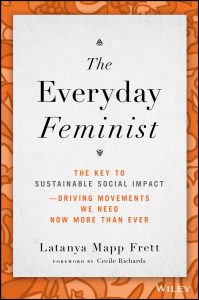Everyday feminists represent their communities in struggles for justice, equality, and transformational social change using their voice and other personal resources to drive social change in response to an environment of, discord or harm. They are relatable and perfectly imperfect in a way that makes them human. They are not the once in a generation, lightening-in a-bottle charismatic leader. Rather, they are mostly ordinary women with extraordinary passion and commitment working toward lasting transformational change. They are the ones who show up, push forward, and who get the hard stuff done. But we’re failing to fund these powerful change agents.
Much of the funding required to further important social and feminist causes sits in capitals of the ten major OECD countries—including the US, where the bulk of philanthropic dollars exist. The latter enjoys tax benefits to giving that some say have produced a culture of documented philanthropy paralleled to none. Of course, the history of giving back to one’s communities is not unique to these countries and is certainly the framework upon which everyday feminists operate. Nonetheless, it is worth examining why the funds for women’s issues and gender equality going to everyday feminists, their organizations, and movements are so limited. Here are a few reasons that we in the women’s fund world hear often.
We can’t find them. It’s true. We fund who we know. Those who are familiar to us. And the degrees of separation from those of us with power and privilege to the everyday feminist is often numerous. Everyday feminists are just that—everyday. They are not the celebrities or people who tend to be spotlighted by the media. They may not yet have fancy profiles up online, nor the infrastructure to have a well-developed communications arm savvy to how those with financial largess identify potential grantees. They likely don’t have the time or capacity to be constantly finding funders and applying for grants the traditional way. And funders typically don’t know them.
Sitting in Silicon Valley, you might have never heard of Lucia Maria Xavier de Castro, the Brazilian social worker and human rights activist. She is an everyday feminist who has dedicated her life to protecting human rights and eradicating patriarchal racism and all forms of discrimination. She is the Founder and Coordinator of CRIOLA, a Black women’s organization in Rio de Janeiro. And you may never have heard of Daniele Duarte, an Afro-Brazilian lesbian activist who works to guarantee human rights for all, also with CRIOLA. We must find these everyday feminists and not wait for them to find us in our comfortable seats of privilege in the global north.
Straight up racism. In 2020, Echoing Green, an incubator for social innovation leadership and Bridgespan, leading social impact consultants, collaborated to research the depth of racial inequities in philanthropic funding. Based on what we see in our work as intermediaries in the sector, two of the biggest factors holding back philanthropy’s efforts to help advance social change are rooted in race:
- Understanding the role of race in the problems philanthropists are trying to solve.
- The significance of race when it comes to how philanthropists identify leaders and find solutions.
In my experience, the same rational applies to Black everyday feminists in Africa, the Caribbean, and other parts of the Diaspora. Therefore we have to honor and center the power of these women in order to strengthen and acknowledge Black everyday feminists in the African Diaspora who we do not usually see. They are doing God’s work and should be funding because of their connections to communities that have been enslaved, colonized, policed, and abused for centuries.
“They don’t have any power to change things” Thirty years into this work, it makes me shake my head when I hear this because it is wrong on so many fronts. And here is how I see it:
“No political clout or decision-making power” Everyday feminists have community clout, which in democratic societies vote in the politicians. And in other societies, everyday feminists can mobilize and organize communities that can make the lives of politicians and the lobbies that support them very difficult. And while there may exist a broad array of decisions being made for or about women in patriarchal societies, the decisions that everyday feminists make are much more centered around the needs of their families, communities, and local populations requiring special protection.
“Not educated” — What these everyday feminists may lack in book knowledge, they more than make up for in historical and cultural knowledge. And quite frankly, everyday feminists’ value for education means that they are often at the helm of changing systems of education to provide access, especially to the most marginalized populations.
“Lack experience” — I hear this a lot about a hesitancy to support the younger or even emerging organizations that everyday feminist lead (compared to the big, traditional, well-known nonprofits that get most of our philanthropic resources today). “Well, they have never run anything before.” Quite to the contrary, these women have been running programs, processes, campaigns, and events in their communities for most of their lives. As we think about founders anywhere, everyday feminists are natural leaders and like their peers can find the right partners to meet the needs of their organizations.
“They don’t deliver” There is a huge difference between asking an everyday feminist to get a law passed or deliver widgets (a number of products or services) within a specified time frame versus actual impact and transformational change. The latter requires long term trusted relationships, flexible resources, and a shift of power and privilege that puts them in the driver’s seat.
Misconceptions & False Narratives about Feminist Organizations There are some who think that if a social problem is worth the hard effort and resources of solving—like substandard education and health care, economic inequalities, or domestic violence—”why not solve it for everyone?” Why take a gender-focused approach at all? It’s the idea that feminist work is somehow uniquely, foundationally exclusionary and divisive. This is a false perception. Viewing certain social issues through a gender lens is not exclusionary but rather enables us to center women and other marginalized genders who would otherwise be last to get resources. However, that doesn’t mean everyday feminists and their organizations exclude men and boys who suffer from the social issues being addressed Donors who want to further social change are shifting these mindsets and stepping up funding and support for feminist movements and organizations by at least $6 billion dollars by 2026, according to a report published last month by the Bridgespan Group. “The solution is in movements—organizations, networks, and leaders that are actually doing this work within communities, led by people who have faced multiple systems of oppression,” says Nidhi Sahni, head of US advisory at Bridgespan and a coauthor of the report. “Because they are cutting across systems, they aren’t being resourced at the level they need to be.” I agree. But the real evidence can be found in the everyday feminists who show up in this work of real, lasting change, time and time again.
 Excerpted with permission from the publisher, Wiley, from The Everyday Feminist by Latanya Mapp Frett. Copyright © 2023 by John Wiley & Sons, Inc. All rights reserved. This book is available wherever books and eBooks are sold.
Excerpted with permission from the publisher, Wiley, from The Everyday Feminist by Latanya Mapp Frett. Copyright © 2023 by John Wiley & Sons, Inc. All rights reserved. This book is available wherever books and eBooks are sold.






Comments (1)
The Everyday Feminist is a must read!